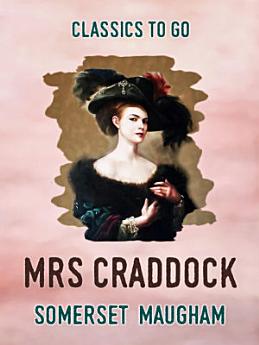Mrs Craddock
Mar 2019 · Otbebookpublishing
Ebook
237
Pages
family_home
Eligible
info
reportRatings and reviews aren’t verified Learn More
About this ebook
Mrs Craddock is a novel by William Somerset Maugham first published in 1902. Set in the final years of the 19th century, Mrs Craddock is about a young and attractive woman of independent means who marries beneath her. As he had written about a subject that was considered daring at the time, Maugham had some difficulty finding a publisher. (Wikipedia)
About the author
William Somerset Maugham (1874-1965) was a British playwright, novelist, and short story writer whose life and work continue to captivate readers and scholars alike. Born in the British Embassy in Paris, Maugham's early life was marked by tragedy, losing both parents by the age of ten. Sent to England to live with an uncle, he found solace in literature, eventually studying medicine at St. Thomas's Hospital in London. This medical background provided rich material for his later writing, infusing his work with a keen understanding of human nature and suffering.Maugham's literary career took off with the success of his novel "Of Human Bondage" (1915), a semi-autobiographical exploration of personal struggle and artistic ambition. His works often delve into themes of existential angst, the complexities of human relationships, and the moral ambiguities of life. His sharp wit and keen observations made him a leading figure in early 20th-century literature.Controversy was never far from Maugham's life. His bisexuality, a taboo subject at the time, and his tumultuous personal relationships often overshadowed his literary achievements. Despite this, he remained unapologetically himself, challenging societal norms and pushing the boundaries of what was considered acceptable in both his personal life and his writing.Maugham's influence extends to contemporary writers like George Orwell and Ian Fleming, who admired his narrative style and complex characters. His revolutionary ideas about the human condition and his fearless exploration of taboo subjects have cemented his place as a literary icon. Today, Maugham is remembered not just for his prolific output but for his unflinching honesty and the enduring relevance of his work.
Rate this ebook
Tell us what you think.
Reading information
Smartphones and tablets
Install the Google Play Books app for Android and iPad/iPhone. It syncs automatically with your account and allows you to read online or offline wherever you are.
Laptops and computers
You can listen to audiobooks purchased on Google Play using your computer's web browser.
eReaders and other devices
To read on e-ink devices like Kobo eReaders, you'll need to download a file and transfer it to your device. Follow the detailed Help Center instructions to transfer the files to supported eReaders.







